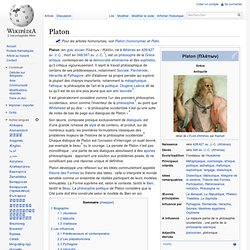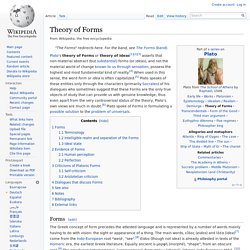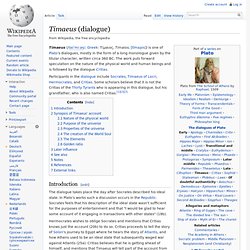

Platon. Un article de Wikipédia, l'encyclopédie libre.

Platon (Πλάτων) Grèce Antiquité Platon (en grec ancien Πλάτων / Plátôn, né à Athènes en 428/427 av. J. Il est généralement considéré comme l'un des premiers philosophes occidentaux, sinon comme l’inventeur de la philosophie[3], au point que Whitehead ait pu dire : « la philosophie occidentale n'est qu’une suite de notes de bas de page aux dialogues de Platon »[4]. Biographie[modifier | modifier le code] À part quelques données certifiées, dont la chronologie est d'ailleurs incertaine, la vie de Platon est mal connue[7]. Jeunesse[modifier | modifier le code] Platon est l’élève de Théodore de Cyrène[16], précepteur de Socrate, de Théétète qui lui enseigne les mathématiques, et de l’historien Timée de Tauroménion, selon Cicéron.
Platon et sa famille Buste de Platon. Malade, il n'assista pas à la mort de Socrate[p. 20] en -399. Platonism. Neoplatonism. Theory of Forms. Plato's theory of Forms or theory of Ideas[1][2][3] asserts that non-material abstract (but substantial) forms (or ideas), and not the material world of change known to us through sensation, possess the highest and most fundamental kind of reality.[4] When used in this sense, the word form or idea is often capitalized.[5] Plato speaks of these entities only through the characters (primarily Socrates) of his dialogues who sometimes suggest that these Forms are the only true objects of study that can provide us with genuine knowledge; thus even apart from the very controversial status of the theory, Plato's own views are much in doubt.[6] Plato spoke of Forms in formulating a possible solution to the problem of universals.

Forms[edit] The Greek concept of form precedes the attested language and is represented by a number of words mainly having to do with vision: the sight or appearance of a thing. A Form is aspatial (transcendent to space) and atemporal (transcendent to time). Meno Phaedo. Timaeus (dialogue) Participants in the dialogue include Socrates, Timaeus of Locri, Hermocrates, and Critias.

Some scholars believe that it is not the Critias of the Thirty Tyrants who is appearing in this dialogue, but his grandfather, who is also named Critias.[1][2][3] Timaeus begins with a distinction between the physical world, and the eternal world. The physical one is the world which changes and perishes: therefore it is the object of opinion and unreasoned sensation. The eternal one never changes: therefore it is apprehended by reason (28a). The speeches about the two worlds are conditioned by the different nature of their objects. Timaeus suggests that since nothing "becomes or changes" without cause, then the cause of the universe must be a demiurge or a god, a figure Timaeus refers to as the father and maker of the universe. Timaeus continues with an explanation of the creation of the universe, which he ascribes to the handiwork of a divine craftsman. Jump up ^ See Burnet, John (1914).